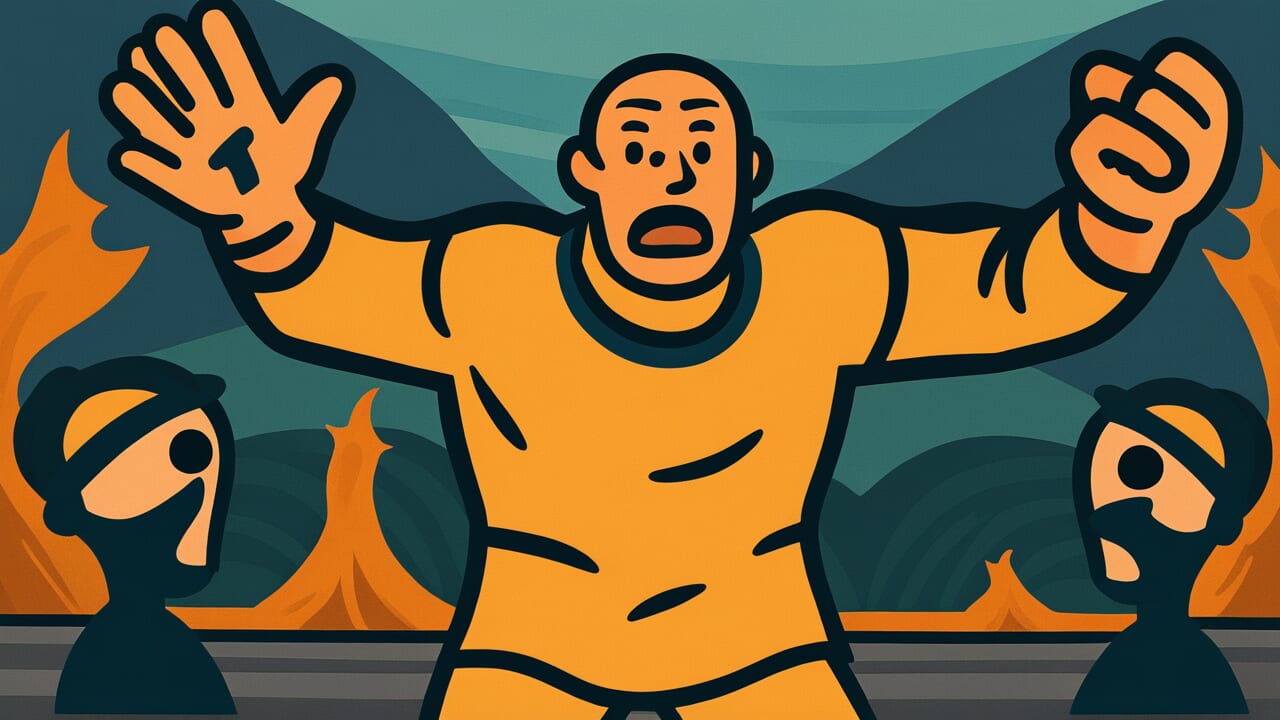How to Read “The wicked are caught by what they themselves have made”
Akunin wa, waga tsukurishi mono ni toraeraruru
Meaning of “The wicked are caught by what they themselves have made”
This proverb means that bad people who plan evil things to hurt others end up destroying themselves instead. The trap they set catches them. The weapon they make hurts them.
You use this saying when someone’s bad plan backfires on them. For example, someone lies to make another person look bad. Then their lie gets discovered and they lose everyone’s trust.
Or someone tries to cheat to make money. Their cheating gets caught and they lose even more money than before.
This proverb is special because it doesn’t just say “bad things bring punishment.” It says something more specific: the exact evil thing you create will be what hurts you.
Even today, we see people’s lies and tricks blow up in their faces. This old saying still warns us about how evil plans destroy the people who make them.
Origin and Etymology
This proverb uses old-style Japanese words. “Waga tsukurishi mono” means “the thing I made.” Here, it means the traps or evil plans that bad people create.
We don’t know exactly when this saying first appeared in writing. But it connects deeply to Buddhist ideas about cause and effect.
Buddhism teaches that good actions bring good results. Bad actions bring bad results. This is called “karma.” The proverb shares this same idea.
What makes this saying interesting is how it explains the structure of evil. When you make a trap to catch someone, that trap has a catching mechanism. That same mechanism can catch you too.
People throughout history have seen this happen many times. That’s why they passed down this wisdom.
The proverb uses passive voice: “are caught.” This shows that the bad person doesn’t choose the punishment. They get trapped automatically by what they made. There’s no escape.
Usage Examples
- He planned fraud to destroy his rival company. But his fraud was discovered and his own company went bankrupt. The wicked are caught by what they themselves have made.
- She spread rumors to ruin someone’s reputation. Those rumors came back to hurt her instead. The wicked are caught by what they themselves have made.
Universal Wisdom
This proverb teaches us a deep truth: evil has a self-destroying nature built into it. Why have people repeated this lesson for thousands of years?
Because humans learned from experience that evil doesn’t just get punished from outside. Evil contains the seeds of its own destruction inside itself.
When you make a trap to catch someone, you must design a catching mechanism. But since you know that mechanism so well, you can easily get caught by it yourself if things change.
When you tell a lie, you need more lies to cover up the first lie. Eventually the lies contradict each other and fall apart.
When you do something dishonest, you need more dishonest acts to hide it. The risk of getting caught grows bigger and bigger like a snowball.
There’s an even deeper insight here. The mind of someone planning evil is already suffering. They feel suspicious and anxious all the time.
They destroy trust with others. They become isolated. They lose peace of mind. So even before any outside punishment comes, they’ve already built a prison for themselves.
The moment you start planning something evil, you start hurting yourself. This proverb shows deep understanding of how human psychology works.
When AI Hears This
Bad people get caught by their own traps because of “over-optimization.” In computer security research, developers sometimes trust their own backdoors too much. Then hackers break in through those same backdoors.
The creator gets too familiar with their own system. They can’t see its weaknesses anymore.
Psychology calls this “functional fixedness.” When you work with your own design repeatedly, your brain optimizes too much for that pattern.
When a bad person tells many lies, those lies form a complex network. Only that person knows the whole picture. But this means when one contradiction appears, only they can predict how it affects everything else.
They become trapped in their own complex system. They can’t move freely anymore.
Here’s something interesting: evil systems can’t fix their own errors easily. Normal systems get feedback from others and improve. But systems built on secrets and lies can’t let outsiders see them.
So they keep running with bugs and defects. Eventually those bugs cause fatal errors that attack the creator. It’s like an autoimmune disease where your defense system attacks yourself.
Lessons for Today
This proverb teaches us that honesty is the smartest way to live. Sometimes it might seem like cheating and lying help you get ahead. But in the long run, dishonest methods always hurt you.
In modern society, information spreads incredibly fast. It’s harder than ever to keep secrets. In the age of social media, even small lies or cheating can spread instantly and cause huge damage.
This means “The wicked are caught by what they themselves have made” happens faster than ever before.
That’s why we need to choose honesty and integrity every day. Not just because it’s morally right. But because it protects us and gives us peace of mind. It’s practical wisdom.
If you have time to plan traps for others, use that time to grow yourself instead. Make sure the things you create make your own life richer and better.
That’s the warm but strict message this proverb gives to us today.



Comments